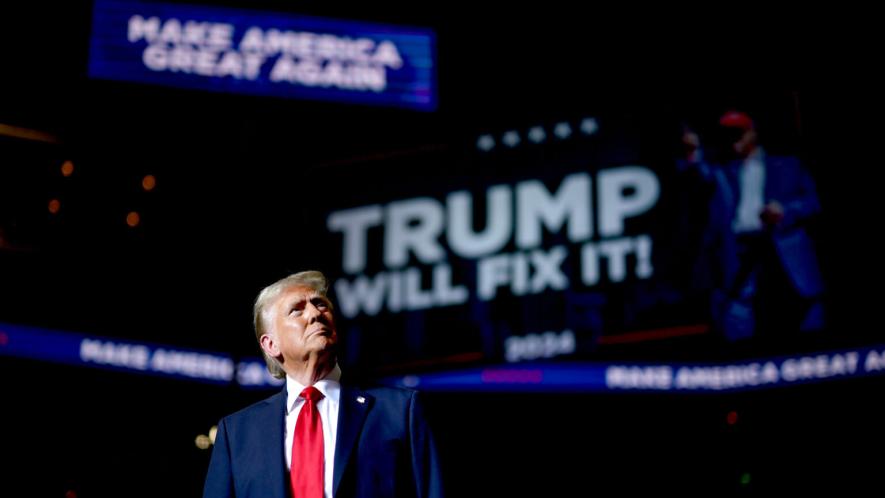Trump Victory in the Context of Capitalist Crisis

Photo via @realDonaldTrump/X
As the people of the US and the world begin to process the realities of a second term of Donald Trump as president of the United States, many have sought to understand how the far-right, anti-worker businessman was able to win the race in such a landslide. Analysts have pointed out that Trump’s victory is not an anomaly, and in recent years, the governments of other major capitalist countries around the world have experienced a similar defeat of incumbent governments amid economic crisis.
Keir Starmer became the UK prime minister after the Labour party secured one of its biggest electoral victories in history in July, winning 412 seats. In comparison, the Conservatives, who held power for almost 15 years, struggled to reach 121 seats. Also in July, Emmanuel Macron’s liberal coalition was defeated at the polls in France. In Japan’s general elections held in late October, the Liberal Democratic Party also lost power.
What is behind these major shifts? According to socialist journalists and left leaders Brian Becker and Eugene Puryear, it is the economic desperation faced by working class people in these major capitalist countries, which have experienced inflationary crises in recent years. “People are desperate for solutions,” BreakThrough News journalist Eugene Puryear said in a recent discussion with Brian Becker, which was aired on The Socialist Program.
Read part two of the full interview, which has been lightly edited for clarity, below. In this interview, Puryear and Becker also go into the rightward shift of the Democratic Party through Kamala Harris’ campaign.
Brian Becker: Incumbent governments in capitalist economies are falling. The Tory government was turned out in the UK, replaced by a Labour government, which is also pretty right wing.
In France, you had Macron do a snap election, thinking his center capitalist party would come back. That was a disaster for him. The far right and also an organized left under the form of a popular front also gained votes. But the capitalist center was defeated.
In Japan, the Liberal Democratic Party, which has been basically one party rule since the US set up the post-World War II Japanese political order, they lost. And the ANC in South Africa.
So in all of these capitalist countries, the working classes, the middle class, the poor, anyway, they weren’t enthusiastic about the incumbency.
When you look at the big picture here, you must come to the conclusion that the crisis of the Democratic Party or the failure of the Democratic Party is really associated with a global failure of the major capitalist countries that dominate the global capitalist economy.
Instead of blaming workers and voters for being too right wing, we need to sharpen the attack and make it even more persuasive to more people, that the problem is capitalism and the solution is in fact a socialist reconstruction or reorganization of the economy.
Because inflation, wage deflation, unaffordable housing, medical care that’s out of reach, all of these are solvable problems. These are the problems of capitalism. The socialist program is actually achievable, and people’s needs could be met.
Eugene Puryear: I think that’s a good point. You could also add Argentina. You could add Australia to that. You could link it also in a major way to the state elections that we’ve seen in Germany, where the issue of the war in Ukraine, which has really been behind this massive spiraling cost of living crisis, became a flashpoint in these state elections that don’t even actually reflect national policy.
You look at Modi, who did succeed in India, but with a much reduced majority, and most people sort of chalk that up to the fact that the India Alliance opposition ran a campaign that was very heavily focused on the inability of the BJP government to address the cost of living crisis and deliver for people as it concerns economic development.
Capitalism as a system is becoming more and more unsustainable. There’s more than enough food to feed everyone in the world, there is more than enough housing. We’re not living in a shortage economy, either in the United States, or on a worldwide level.
We’re living in an economy where there are artificial shortages, because the primary issue of how society is organized in the United States, in the Global North and around the world more broadly, except for a few countries, is to organize everything to make a profit.
Clothes are made, not to put clothes on people’s back, but to make a profit. Homes are made, not to put shelter over people’s heads, but to make a profit. Food is grown, not to actually feed people, but to make a profit. Water even is basically produced primarily only to make a profit.
You look at almost every single thing that exists in society, and even where it’s not made to make a profit, when it’s a public utility, every single public utility around the world is totally under attack, because they say the reason the public utilities aren’t that good is because they’re not designed to make a profit.
We live in a world that’s creating artificial scarcity and artificial shortages, as opposed to applying the human and material resources that we have at hand to meet people’s needs, to have a people-first versus a profit-first reality.
You have more pure right-wing movements. You have the rise of more left-wing and socialist movements. You have ideas that have been pushed out of the mainstream of the capitalist reality being brought back in, because people are desperate for solutions.
BB: I mentioned that Harris ran to the right, meaning she tried to pretend she was a Reagan-like Democrat to win over Republicans. I want you to talk about whether that succeeded. She was running around the country with Liz Cheney, who’s really, really right wing. And her father, of course, is the architect of the Iraq war.
This is what the Democrats always do. When the right gets stronger, they move to the right. They don’t say, we’re going to have a clear left-wing, anti-right wing anti-capitalist program. They’re so wedded to Wall Street, so wedded to the corporations, so wedded to the military industrial complex, and so insipid when it comes to fighting the right, that they embrace the right. So did it work?
EP: Well, from what I saw, it did not work. I did see at least one poll that it actually went down 1%, the support for registered Republicans. For Kamala Harris, it certainly was below 10%. So we’re in the single digits, and it was less than where they were in 2020.
In fact, to your point, I think it could have backfired against them, because there are so many odious things tied to many of these Republicans, especially the neocon wars. This is an issue that Trump was bringing up in relation to the Cheneys right there at the end, saying that, how could any Muslim or Arab person support the Democratic ticket when they’re bringing out the people who are supporting and invading Iraq and all of these other countries?
So hypocritical it may be for Trump, but nonetheless, I think he was spot on in some senses, that it probably was such a glaring contradiction that undoubtedly must have driven some people to stay home.
All the things that they’re saying are so bad about Trump, are things that the Bush administration was doing quite a bit, things that the Reagan administration was doing quite a bit. Reagan, who started his 1980 campaign, in Philadelphia, Mississippi, where three civil rights workers had been lynched in the summer of 1964 in a reign of terror across Neshoba County, to prevent Black people from voting and being able to integrate public facilities. These are the people you’re saying were the great mythical Republican Party. You can look at the role that Reagan played in the invasion of Grenada, the demonization of those on public assistance.
BB: Well, in one way, Ronald Reagan was actually to the left of Kamala Harris’s program in 2024, because in 1986, Reagan signed an immigration reform bill, what was originally called the Simpson-Mazzoli Act, and that allowed 3 million people who are undocumented, in the current language, “illegal aliens”, to become citizens or to have a pathway to citizenship. Many more people were given legal status.
The last time there was immigration reform was 1986. That’s almost 40 years ago. You have Kamala Harris today saying, we’re going to build a wall. She sounded more like Trump about this than Ronald Reagan.
EP: If you look at the Republican Party platform of 1980 when Reagan first ran, you might be surprised how much of what was in there was actually implemented by Bill Clinton in 1992 through 1999, especially as it concerns many of the issues around public assistance, so-called welfare reform, and so on.
In his 1992 campaign, Bill Clinton rolled out a whole tough on the border thing himself, to try to criticize the Republicans similarly for not being tough enough on the border. Once he becomes the president, he pursues a border policy that is designed to drive [migrants] into the most dangerous parts of the desert, hoping they die, in order to deter them through death.
The biggest mistake we could make is to say that Trump is some sort of new phenomenon. I view Reagan as a part one and and Trump is a part two of the exact same program.
We can date it to Reagan’s primary run in the Republican primary in 1976 to the creation of this project, starting with the Powell memo and this huge push by corporate America to wage an offensive against all of the things that they thought were terrible in terms of what was happening to the country: the rise of the Great Society programs, the elements of the Civil Rights Act, what they believe was infringing upon private property, the rise of the consumer rights movement, the rise of the environmental movement, the fact that there was a growing space in society for intellectual challenges to either capitalism as a whole or at least elements of capitalism.
The elites who ran society were worried that things were getting away from them a little bit. And so they came up with a plan. And this was embraced by all of the biggest corporations on Earth.
They formed think tanks like the Heritage Foundation, [which is] right at the center of Project 2025. [These corporate elites] decided they were going to put together a political program designed to roll back workers’ rights, civil rights, women’s rights, consumer rights, and environmental rights in order to make sure that they could have as much ability to profit as they possibly could, and that they would also make a huge thing underlining all of this big tax cuts so that they were able to then keep more of their ill gotten gains that they would be getting by steamrolling over all of the constituencies that I just mentioned.
Trump is really a culmination of what was being started under Reagan, in this attempt to roll back reforms that were made because working class people, Black people, others had risen up and demanded elements of their rights, demanded changes to the economy.
This is not a struggle between Democrats and Republicans. This is a struggle between the decline of capitalist dynamism and the rights of working class people, because there is no way that you can improve the life of the average person in America without infringing upon the rights of capital to make profit at all costs.
Brian Becker is a founding member of the Party for Socialism and Liberation and the host of the Socialist Program.
Eugene Puryear is a journalist at the US movement-centered Breakthrough News and a member of the Party for Socialism and Liberation.
Get the latest reports & analysis with people's perspective on Protests, movements & deep analytical videos, discussions of the current affairs in your Telegram app. Subscribe to NewsClick's Telegram channel & get Real-Time updates on stories, as they get published on our website.
























